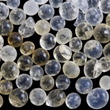Anhydrous crystalline maltose
Anhydrous crystalline maltose
Natural Standard Bottom Line Monograph, Copyright © 2013 (www.naturalstandard.com). Commercial distribution prohibited. This monograph is intended for informational purposes only, and should not be interpreted as specific medical advice. You should consult with a qualified healthcare provider before making decisions about therapies and/or health conditions.
While some complementary and alternative techniques have been studied scientifically, high-quality data regarding safety, effectiveness, and mechanism of action are limited or controversial for most therapies. Whenever possible, it is recommended that practitioners be licensed by a recognized professional organization that adheres to clearly published standards. In addition, before starting a new technique or engaging a practitioner, it is recommended that patients speak with their primary healthcare provider(s). Potential benefits, risks (including financial costs), and alternatives should be carefully considered. The below monograph is designed to provide historical background and an overview of clinically-oriented research, and neither advocates for or against the use of a particular therapy.
Related Terms
ACM, disaccharide.
Background
Anhydrous crystalline maltose has been used as a food stabilizer and a desiccant (chemical agent used to absorb moisture) for use in foods, cosmetics, and pharmaceuticals.
Anhydrous crystalline maltose has been studied in patients with Sjogren's syndrome (inflammatory autoimmune disorder) for treatment of dry mouth.
Limited information is currently available about the effects of anhydrous crystalline maltose for the treatment of any indication in humans.
Scientific Evidence
Uses These uses have been tested in humans or animals. Safety and effectiveness have not always been proven. Some of these conditions are potentially serious, and should be evaluated by a qualified healthcare provider. |
Grade* |
Dry mouth (Sjogren's syndrome) Anhydrous crystalline maltose (ACM) has been studied and may be effective for relieving symptoms of dry mouth associated with Sjogren's syndrome (inflammatory autoimmune disorder characterized by a dry mouth and dry eyes). Additional study is needed. |
C |
*Key to grades:A: Strong scientific evidence for this use; B: Good scientific evidence for this use; C: Unclear scientific evidence for this use; D: Fair scientific evidence against this use (it may not work); F: Strong scientific evidence against this use (it likely does not work). |
|
Tradition/Theory
The below uses are based on tradition or scientific theories. They often have not been thoroughly tested in humans, and safety and effectiveness have not always been proven. Some of these conditions are potentially serious and should be evaluated by a qualified health care professional.
Insufficient available evidence.
Dosing
The below doses are based on scientific research, publications, traditional use, or expert opinion. Many herbs and supplements have not been thoroughly tested, and safety and effectiveness may not be proven. Brands may be made differently, with variable ingredients, even within the same brand. The below doses may not apply to all products. You should read product labels, and discuss doses with a qualified healthcare provider before starting therapy.
Adults (over 18 years old)
There is no proven effective dose for anhydrous crystalline maltose. However, 200-milligram lozenges have been taken by mouth three times a day for up to 24 weeks for relief of dry mouth in Sjogren's syndrome.
Children (under 18 years old)
There is no proven safe or effective dose for anhydrous crystalline maltose in children.
Safety
The U.S. Food and Drug Administration does not strictly regulate herbs and supplements. There is no guarantee of strength, purity or safety of products, and effects may vary. You should always read product labels. If you have a medical condition, or are taking other drugs, herbs, or supplements, you should speak with a qualified healthcare provider before starting a new therapy. Consult a healthcare provider immediately if you experience side effects.
Allergies
Avoid in individuals with a known allergy or hypersensitivity to anhydrous crystalline maltose.
Side Effects and Warnings
Anhydrous crystalline maltose appears safe, although there is a lack of available reports on adverse events. Avoid in patients with a known allergy or hypersensitivity to anhydrous crystalline maltose.
Pregnancy & Breastfeeding
Anhydrous crystalline maltose is not recommended in pregnant or breastfeeding women due to a lack of available scientific evidence.
Interactions
Most herbs and supplements have not been thoroughly tested for interactions with other herbs, supplements, drugs, or foods. The interactions listed below are based on reports in scientific publications, laboratory experiments, or traditional use. You should always read product labels. If you have a medical condition, or are taking other drugs, herbs, or supplements, you should speak with a qualified healthcare provider before starting a new therapy.
Interactions with Drugs
Insufficient available evidence.
Interactions with Herbs & Dietary Supplements
Insufficient available evidence.
Author Information
This information is based on a systematic review of scientific literature edited and peer-reviewed by contributors to the Natural Standard Research Collaboration (www.naturalstandard.com).
References
Natural Standard developed the above evidence-based information based on a thorough systematic review of the available scientific articles. For comprehensive information about alternative and complementary therapies on the professional level, go to www.naturalstandard.com. Selected references are listed below.
Fox PC, Cummins MJ, Cummins JM. A third study on the use of orally administered anhydrous crystalline maltose for relief of dry mouth in primary Sjogren's syndrome. J Altern Complement Med 2002;8(5):651-659. View Abstract
Fox PC, Cummins MJ, Cummins JM. Use of orally administered anhydrous crystalline maltose for relief of dry mouth. J Altern Complement Med 2001;7(1):33-43. View Abstract
Copyright © 2013 Natural Standard (www.naturalstandard.com)
The information in this monograph is intended for informational purposes only, and is meant to help users better understand health concerns. Information is based on review of scientific research data, historical practice patterns, and clinical experience. This information should not be interpreted as specific medical advice. Users should consult with a qualified healthcare provider for specific questions regarding therapies, diagnosis and/or health conditions, prior to making therapeutic decisions.
Updated:
March 22, 2017
